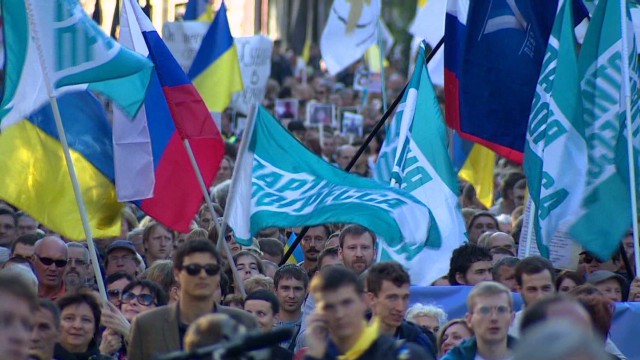Shifting Sands: Trump's Presidency And The West's Response To Russia's Ukraine Policy

Table of Contents
The historical context is vital. Russia's annexation of Crimea in 2014, following the Euromaidan Revolution, and the ongoing conflict in Donbas, fueled by Russian-backed separatists, dramatically destabilized the region. These events foreshadowed the full-scale invasion of Ukraine in 2022. This article argues that Trump's presidency significantly altered the West's response to these escalating provocations, creating both immediate and long-term consequences.
Trump's Approach to Russia and Ukraine
Ambivalence and Non-Interventionism
Trump's presidency was marked by an apparent reluctance to strongly condemn Russian actions in Ukraine. This perceived ambivalence contrasted sharply with the responses of previous administrations.
- Examples of pro-Russia statements: Trump publicly questioned the validity of the annexation of Crimea, suggesting a willingness to accept the fait accompli. He also frequently praised Vladimir Putin, sometimes to the detriment of US allies.
- Downplaying Russian aggression: Trump repeatedly minimized Russia's role in the conflict in Donbas, often casting doubt on intelligence assessments of Russian involvement.
- Potential Motivations: Several theories attempt to explain Trump's approach. These include a personal affinity for Putin, a desire to improve relations with Russia to counter China, or a broader skepticism towards international interventionism.
Impact on NATO and Transatlantic Relations
Trump's rhetoric and policies towards NATO and European allies deeply impacted the coordinated Western response to Russia's actions. His consistent criticism of NATO allies for not meeting their financial commitments and his questioning of the alliance's overall value undermined transatlantic unity.
- Criticisms of NATO allies: Trump repeatedly labeled NATO allies as "delinquent" and threatened to withdraw the US from the alliance, creating uncertainty and anxiety among European members.
- Consequences for transatlantic security cooperation: Trump's actions weakened the alliance's cohesion and its ability to present a unified front against Russian aggression. This fostered a sense of vulnerability among Eastern European nations particularly worried about Russian expansionism.
The West's Response Under Trump's Presidency
Divided Responses Within the West
Despite Trump's approach, the Western response to Russia's actions in Ukraine was not monolithic. Significant divisions emerged amongst Western nations.
- Strong Support for Ukraine: Countries like the United Kingdom, Canada, and the Baltic states continued to provide substantial support to Ukraine, both militarily and diplomatically.
- Hesitant or Ambiguous Stances: Other European nations, particularly those with strong economic ties to Russia, adopted more cautious and less confrontational stances, reflecting internal political pressures and economic considerations.
Sanctions and Economic Pressure
Economic sanctions remained a key element of the Western response during the Trump years. However, the effectiveness of these sanctions in deterring further Russian aggression was debated.
- Specific examples of sanctions: The US and EU imposed various sanctions targeting Russian individuals, companies, and sectors of the economy, including finance, energy, and defense.
- Effectiveness of sanctions: While sanctions undoubtedly imposed costs on the Russian economy, their effectiveness in altering Russia's behavior in Ukraine remained a subject of ongoing debate. The sanctions' impact was often offset by increasing energy prices and diversified trade relations.
Long-Term Implications and Legacy
Weakened Deterrence?
Trump's approach toward Russia raised concerns about whether it weakened Western deterrence against further Russian aggression.
- Arguments for emboldened Russia: Critics argued that Trump's actions signaled a diminished US commitment to defending its allies in Eastern Europe, potentially emboldening Russia.
- Arguments against weakened deterrence: Others maintain that the overall Western response, despite internal divisions, still imposed significant costs on Russia and ultimately deterred further major escalations. The long-term consequences for European security are still unfolding.
Rebuilding Trust and Cooperation
The Trump years left a significant legacy of mistrust and fractured relationships within the Western alliance. Rebuilding trust and cooperation has been a major challenge.
- Steps taken to repair relationships: The Biden administration has made a concerted effort to reaffirm US commitment to NATO and strengthen transatlantic partnerships, but the damage done persists.
- Ongoing challenges: Maintaining a unified front against Russian aggression continues to be a significant challenge, requiring sustained diplomatic efforts and a coordinated approach to address Russia's destabilizing actions.
Conclusion
Trump's presidency fundamentally altered the West's response to Russia's Ukraine policy. His ambivalence towards Russian aggression, criticism of NATO allies, and downplaying of Russian actions created divisions within the Western alliance and arguably weakened deterrence. While the West did impose sanctions and continue supporting Ukraine, the internal fissures and uncertainties created during this period had lasting consequences. Understanding Trump's Presidency and the West's evolving response to Russia's Ukraine policy is crucial for future stability. Continue the conversation: What lessons can be learned from Trump's Presidency and the West's response to Russia's Ukraine policy?

Featured Posts
-
 Captain America Brave New World Pvod Streaming Options A Complete Guide
May 14, 2025
Captain America Brave New World Pvod Streaming Options A Complete Guide
May 14, 2025 -
 Is Captain America Brave New World The End Of The Mcus Darkest Period
May 14, 2025
Is Captain America Brave New World The End Of The Mcus Darkest Period
May 14, 2025 -
 Tyler Fitzgeralds Strong Stretch Continues In Giants Win
May 14, 2025
Tyler Fitzgeralds Strong Stretch Continues In Giants Win
May 14, 2025 -
 Emma Raducanus Dubai Defeat Loss To Muchova At Tennis Championships
May 14, 2025
Emma Raducanus Dubai Defeat Loss To Muchova At Tennis Championships
May 14, 2025 -
 Pre Order Captain America Brave New World 4 K Blu Ray Steelbook Edition
May 14, 2025
Pre Order Captain America Brave New World 4 K Blu Ray Steelbook Edition
May 14, 2025
Latest Posts
-
 Paolinis Dubai Defense Crumbles Sabalenka Triumphs
May 14, 2025
Paolinis Dubai Defense Crumbles Sabalenka Triumphs
May 14, 2025 -
 Zheng Qinwen Falls Short In Madrid Open Clash Against Potapova
May 14, 2025
Zheng Qinwen Falls Short In Madrid Open Clash Against Potapova
May 14, 2025 -
 Sabalenka Defeats Mertens In Madrid Open Top Ranked Players Victory
May 14, 2025
Sabalenka Defeats Mertens In Madrid Open Top Ranked Players Victory
May 14, 2025 -
 Daria Kasatkinas Australian Debut Wta Rankings And Celebration
May 14, 2025
Daria Kasatkinas Australian Debut Wta Rankings And Celebration
May 14, 2025 -
 Muchova Defeats Raducanu At Dubai Tennis Championships
May 14, 2025
Muchova Defeats Raducanu At Dubai Tennis Championships
May 14, 2025
